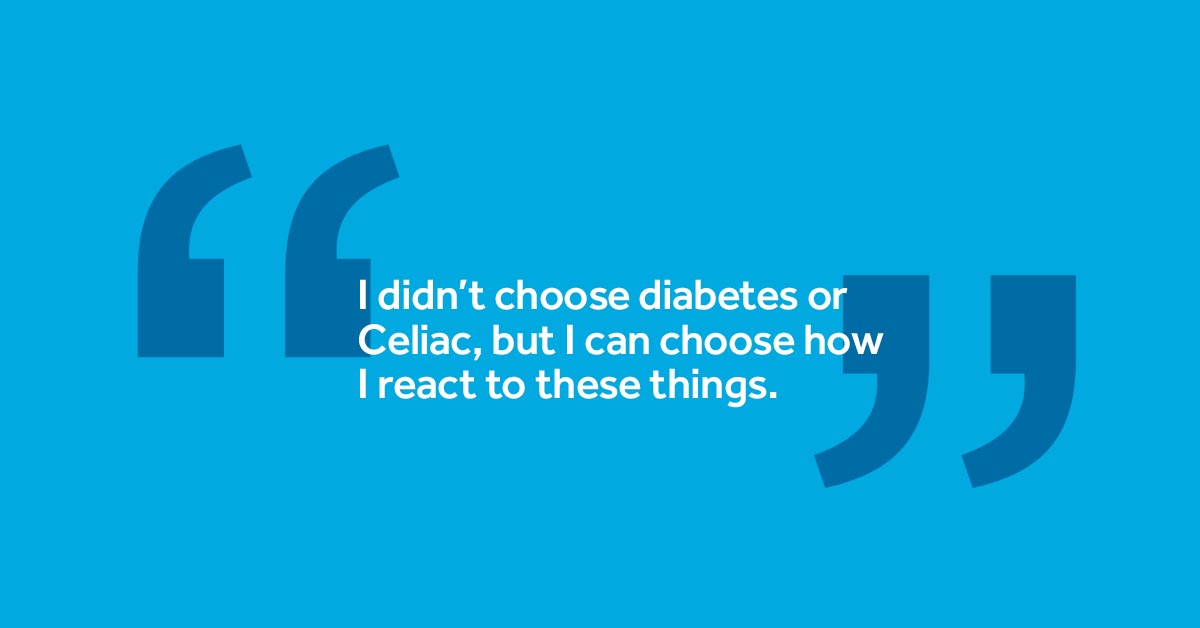Thyroid disorders and type 1 diabetes: Diabetes forecast

A few years ago I felt extremely sluggish and I kept thinking it was blood sugar symptoms. When I talked to my endocrinologist about this, she checked my thyroid levels and “hypothyroid” was added as a new diagnosis on my chronic illness list. It wasn’t a surprise because it runs in my family and I know my immune system is more susceptible because of type 1 diabetes. But since my diagnosis, I have learned that there are a lot of people who live with both diabetes and thyroid issues. There are some interesting connections that you might not know about.
Here’s an excerpt from the January edition of Diabetes Forecast article “Thyroid Disorders and Type 1 Diabetes” written by Allison Tsai.
 |
| MedicalRF.com/Getty Images |
“Common things occur commonly” is an old medical school adage used to remind future doctors that two common diseases will frequently overlap but aren’t necessarily related. The link between type 2 diabetes and thyroid disease is a perfect example of this, says Peter Arvan, MD, PhD, professor of internal medicine and chief of the Division of Metabolism, Endocrinology, and Diabetes at the University of Michigan.
In the United States, nearly 28 million people have type 2 diabetes and 20 million have some form of thyroid disease. This means that people with type 2 diabetes frequently have thyroid disease as well. But type 2 does not increase your risk for thyroid disease. People with type 1 are even more likely to have thyroid problems, even though type 1 doesn’t directly cause thyroid disease. According to the American Diabetes Assocation’s 2016 Standards of Medical Care in Diabetes, autoimmune thyroid disease occurs in 17 to 30 percent of people with type 1.
The Regulator
The thyroid is a butterfly-shaped gland in the neck that produces two hormones, triiodothyronine, also known as T3, and thyroxine, or T4, which regulate your metabolism. “[It’s] sort of like the body’s furnace,” Arvan says. In addition, the thyroid affects brain development, breathing, heart and nervous system function, body temperature, muscle strength, skin dryness, menstrual cycles, weight, and cholesterol levels.
Mixed Signals
Many different things can cause hyperthyroidism and hypothyroidism, but in people with type 1 diabetes, the root cause is typically an autoimmune problem, says Arvan. People whose genes make them susceptible to autoimmune diseases will frequently develop more than one.
“The immune system doesn’t recognize the beta cell [in the pancreas] or the thyrocyte [in the thyroid] as belonging to self, and so they are attacked,” says R. Mack Harrell, MD, medical imaging director at the Memorial Center for Integrative Endocrine Surgery and past president of the American Association of Clinical Endrocrinologists, noting that occasionally there’s crossover—the immune system attacks several parts of the body.
Hyperthyroidism—The most common cause of an overproduction of thyroid hormone in people with type 1 is Graves’ disease, says Peter Singer, MD, a professor of clinical medicine and director of the Thyroid Diagnostic Center at the University of Southern California’s Keck Hospital. Graves’ disease is an autoimmune disorder that causes the body to produce an antibody, called thyroid-stimulating immunoglobulin (TSI), that overrides the normal regulation of the thyroid. This causes too much thyroid hormone to be produced.
Symptoms—You may have an increased heart rate and heart palpitations. Because your metabolism speeds up, you may feel warm, lose weight, or have difficulty falling asleep. “You feel amped up,” says Singer. “Like if your car has six cylinders, you may feel like you’re on eight cylinders.”
Hypothyroidism—Hashimoto’s disease is also an autoimmune disorder common in people with type 1 diabetes. In fact, Hashimoto’s disease is the most common cause of hypothyroidism in the United States. In this case, the immune system attacks the thyroid gland, which interferes with its ability to produce enough thyroid hormone for the body.
Symptoms—You may feel cold; have a slow heart rate; gain weight; experience fatigue, sluggishness, or an increased desire for sleep; become constipated; or notice your hair is thinning and dry. In the same car analogy, Singer says, “instead of six cylinders, you feel like you have four.”
Three common blood tests can measure blood levels of either the thyroid hormones (T3 and T4) or thyroid stimulating hormone (TSH). Several other tests can be done if Graves’ disease is suspected, such as a radioactive iodine uptake test, a thyroid scan, or a TSI antibody test. If Hashimoto’s disease is a possibility, another antibody test, called an antithyroid antibody test, is available.



